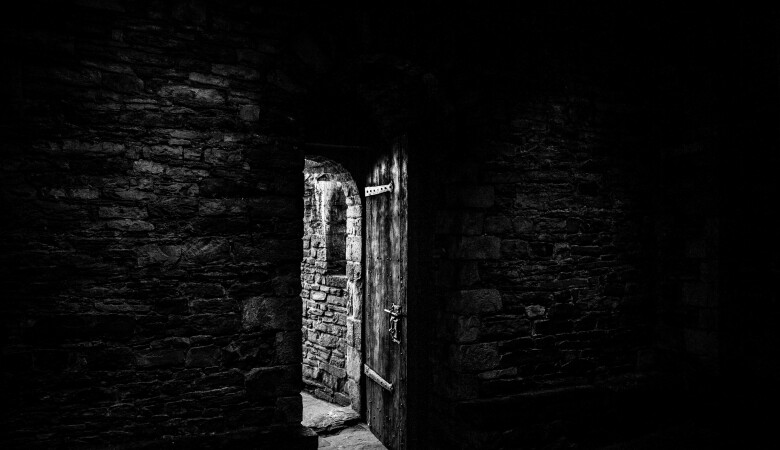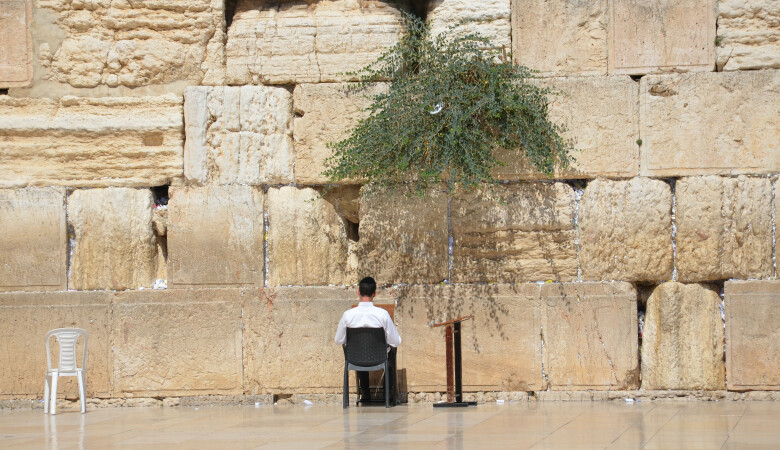Series: Mark
Peter Denies Jesus, Jesus Restores Peter (Mark Sermon 83)
March 24, 2024 | Andy Davis
Mark 14:66-72
Fullness in Christ, Humility
The true Peter was not the one who denied Jesus, but the one who boldly proclaimed him on Pentecost. God's grace rescued and restored Peter to his service.
- SERMON TRANSCRIPT -
When we get to heaven, we're going to spend eternity studying the glory of God. The new Jerusalem, the new heaven, new earth will be radiant and illuminated with the glory of God. There will be no need for the light of the sun or the moon or a lamp to shine because the glory of God is going to give it light. But what is that? The glory of God is the radiant display of the perfection and attributes of God. But for us personally, as we are in that place, one attribute more than anything else will shine radiantly brightly and that is the grace of God. We were saved to the praise of his glorious grace. It says in Ephesians 2:7 that, "When we get to heaven, for in the ages to come, we'll be celebrating the riches of his grace expressed in his kindness to us in Christ Jesus."
He's going to show us how gracious He was to us, how much grace He showed to us, and not just to us individually, but to our brothers and sisters who we will finally see, that radiant display of the redeemed from every tribe and language and people and nation. We are going to know that we ourselves and all of them were sinners saved by grace. For the next verse says, "For it is by grace you have been saved through faith. And this not of yourselves is the gift of God, not by work so that no one can boast."
We're going to learn also that not only did God save us by grace, He used us and employed us by grace. It was by grace that our lives counted for something for all eternity. He actually employed people like you and me to build His eternal kingdom. We're going to celebrate that too, saved by grace and employed by grace. The apostle Paul said in a beautiful display of a sense of that, "I am the least of all the apostles and I don't even deserve to be called an apostle because I persecuted the church of God, but by the grace of God, I am what I am. And as grace to me was not without effect. No, I worked harder than all of them, yet not I, but the grace of God that was in me."
"Not only did God save us by grace, He used us and employed us by grace. It was by grace that our lives counted for something for all eternity."
We're going to celebrate not only the grace of God in forgiving us of our sins, but in using people like us to build an eternal kingdom. That's amazing, isn't it? The amazing grace of God. The story we're going to look at today is a story of a trophy of God's grace. The other great apostle in the New Testament, Peter, who could absolutely agree with what Paul said, "I don't deserve to be called an apostle because I denied Jesus at the key moment. I denied even knowing him. I don't deserve to be an apostle, but by the grace of God, I am what I am, and He used me despite my sin."
What is grace? How do we understand that? It's a complex concept. Simple definitions don't do, because it is such an important word. It shows up in so many vital verses. I've tended to see it as a determination, an unshakable determination in the heart of the triune God to do eternal good to those who deserve His eternal curse. It's heaven and not hell. And not only that, but it's all of the lesser moments and movements and actions that flow from that settled determination to us. Those are all called grace as well. I think of it like a river of grace flowing from the throne of God, like the river of the water of life flowing clear as crystal from the throne of God. That's grace, just flowing and flowing and flowing to us, grace.
As we look at this very tragic story today, this story of Peter, we're going to see a display of grace. I couldn't just leave it in how bad it was for Peter that night, breaking down and crying bitterly. I had to, like the sermon title, “Peter Denies Jesus, Jesus Restores Peter,” and you're like, "Well, I thought you were an expositor pastor. There's no restoration here." I know, but he does get restored and I couldn't just leave it depressing and sad. I wanted to talk about Jesus's restoration of Peter to give us hope. It is a sad story and a devastating one. It's devastating because it's amazing how powerful and devious sin really is. It's devious, it's deceptive, and it strikes remarkably quickly here, like a serpent strike, like a viper coming instantly and boom, suddenly, he's where you'd never thought he would be. The question that comes is how can such a mighty follower of Christ as Peter fall so far as to call down curses on himself if he even knew Jesus? How can sin be that powerful? How can temptation be that effective? It is just relationally surpassingly sad that Jesus at the greatest moment of his life as a human being had no friend to stand with him, and Peter should have been that friend, and he didn't stand with Him. He didn't have the smallest amount of courage to stand with Him. Furthermore, concerning, and we're going to walk through all this in detail, but concerning who Peter was and what the plans were for his role, this is a very significant failure on his part.
Peter was warned, or Jesus had warned his disciples, "If anyone would come after me, he must deny himself and take up his cross and follow me, for whoever wants to save his life, will lose it, but whoever loses his life for me, will find it." We'll talk about that passage a number of times in this sermon, but that was the warning. Later in the Bible it would be said in the book of Revelation, in Revelation 12, concerning the followers of Jesus in defeating Satan Revelation 12:11, "They overcame him by the blood of the lamb and by the word of their testimony, they did not love their lives so much as to shrink from death.” But that night Peter was not so. He did love his life so much as to shrink from death. He saved his life at the expense of his testimony and his faith in Jesus.
But yet, ultimately the story is hopeful. We see the incredible grace of Christ in rescuing Peter from so great as sin. The true Peter, the real Peter is not on display in this account, but rather, the one who boldly proclaimed Christ in front of the city of Jerusalem on the day of Pentecost, filled with the spirit, and then two chapters later, boldly proclaimed Christ to the Sanhedrin that had executed his Lord, boldly and courageously, unafraid of death. That's the true Peter. That's the one we're going to meet in heaven.
So what is this man but a masquerade, someone who got in with the wrong people and was influenced by them and because of that influence became what he was not, acted like what he was not. He was masquerading as an unbeliever, masquerading as one who didn't even know Jesus, but that wasn't who he really was. We're going to see the amazing, the incredible, the powerful grace of God in restoring such a sinner as Peter. I want all of us to be hopeful, be hopeful because we are weak like Peter, aren't we? Aren't we? We're put in situations, we get in over our heads, we say things we wish we hadn't said, we do things, or we leave undone things we feel like we wanted to do. So this story for... It's our story and it's a hopeful story.
I The Downward Journey of Peter’s Sin
Let's begin and trace out the downward journey of Peter's sin. Let's remember the context. This man, Peter, was the leader of the twelve apostles. In every list of the apostles, Peter is always named first. He seemed to have been the leader in many encounters through Jesus's life with them as recorded in the Gospels. At a key moment, Jesus will say something and Peter will be the one to speak up. It happens a lot. Most prominently, as I've alluded to already, at Caesarea Philippi as recorded in Matthew 16, "Who do people say I am?" They give various answers. “'But what about you? Who do you say that I am?’" Simon Peter answered, ‘You are the Christ, the son of the living God.”' Jesus replied, ‘Blessed are you, Simon, son of Jonah, for this was not revealed to you by man, but by my Father in heaven. And I tell you that you are Peter and on this rock I will build my church and the gates of Hades will not prevail against it.’"
It's an incredible statement. Peter was the key leader among the twelve apostles. However, that night, the night of Jesus's arrest, the night of the Last Supper, the night of Gethsemane, then the night of his arrest and all that was the worst night of Peter's life, and it began, as we saw a few weeks ago, with Jesus warning them all about what was about to happen. "You will all fall away." Jesus told them, "For it is written, I will strike the shepherd and the sheep will be scattered. But after I have risen, I'll go ahead of you into Galilee." Peter declared, "Even if all fall away, I will not." I'll talk more about that statement in a moment, but that's what happened. Jesus made that plain prediction. Verse 30, "I tell you the truth to today, yes, tonight before the rooster crows twice, you yourself will disown me three times."
But even then Peter answers pridefully, he insisted emphatically, verse 31, "Even if I have to die with you, I will never disown you." Then in Gethsemane we see Peter’s prayerlessness, and I have learned a long time ago, as I look at my own life, my own weaknesses and my own failures. Prayerlessness is evidence of self-reliance in part, of a lack of faith and self-reliance. When you think you can handle this, you don't need to pray about it. Jesus has Peter, James and John with Him in a separate kind of special place. He goes off and prays, but then He comes back, He returned to his disciples and found them sleeping. "Simon," He said to Peter, He focuses on Peter, "Simon, are you asleep? Could you not keep watch for one hour? Watch and pray so that you will not fall into temptation. The spirit is willing but the body is weak."
Then again, He comes back and finds some sleeping because their eyes were heavy. Then a third time He says, "Are you still sleeping and resting? Enough. The hour has come. Your time of prayer is over. You had a chance to pray. You didn't. You were asleep. The hour has come. Behold the son of man is betrayed into the hands of sinners. Rise, let us go. Here comes my betrayer." We're tracing out the slide for Peter, how it happened.
The next piece of information we get is from John's Gospel in John 18. It says, "Jesus, knowing all that was going to happen to him, went out to those that were there to arrest him. He went out and asked them, 'Who is it you want? What are your orders? Who are you here for?' 'Jesus of Nazareth,' they replied. Jesus said, 'I am.'" It's God's name. He said, "'I am.' “When He said that, they all drew back and fell to the ground." It's incredible. Jesus is forcing His captors to state their orders. Who are they looking for? It's amazing, isn't it? Jesus is in charge of His own arrest. He just takes charge of His own arrest.
Then masterfully, He crafts the net, I mean, the escape, I would say, a safety net for his disciples to escape temptation and apostasy. “Again, He asked them, ‘Who is it you want?' ‘Jesus of Nazareth,’ they answered. ‘I have told you that I am. If you're looking for me, then let these men go.’ This happened so that the words he had spoken would be fulfilled, I have not lost one of those you gave me”. It's a deep concept. The implication... the word “lost,” when He prayed at the chapter before in John 17 is “lost eternally and spiritually,” like apostasy. He's protecting them from being arrested that night so they wouldn't apostasize. He's making a way of escape. He's controlling the temptation so they won't be tempted beyond what they can bear.
He wants them to run away. He wants them to get away, and they all did. But before that, of course, Peter draws a sword to fight. What is going on in his mind? Peter does not understand the atonement, doesn't understand any of these things, and we walk through that. He cuts off the servant’s ear. Jesus rebukes him, "Put your sword away," and then at that point, somewhere in there, they all run away, including Peter.
We all know Peter would've done well to keep running and go to his home and spend the night there or someplace. That would've been better for Peter, but he couldn't do it, could he? So he doubles back. Why? I have to believe it's pride. He made all these promises, all these pledges, and he's got to prove himself. So he comes back and follows at a distance and goes right into the courtyard of the high priest, following right in. He is in, effectively, the lion's den now, way in over his head as events will prove.
Now, as we see this, there's going to be a clear contrast between Peter and Jesus. We've got Peter's confused journey. He's trying to stay close to Jesus. Look at verse 53, 54, "They took Jesus to the high priest, and all the chief priests, elders and teachers of the law came together. Peter followed him at a distance, right into the courtyard of the high priest. There, he sat with the guards and warmed himself in the fire." This contrast between Jesus and Peter is most clearly seen in John's Gospel, but it's implied in the synoptics, in Matthew, Mark, Luke as well. In John's narrative, it goes like this, you got Jesus's trial, Peter's denial. Meanwhile, back at the trial, meanwhile, back at the denial. It's clear - compare and contrast. The clear purpose is to contrast the serenity and power and courage of Jesus with the sinful cowardice and falsity of Peter. The glory of Christ and the sinfulness of man. That's what's on display in John's Gospel. We have that same idea here.
How do we kind of harmonize these denial accounts? Matthew, Mark, and Luke are in general agreement. They list three denials. First, before a servant girl in the courtyard. Second, before a servant girl, maybe the same or another one, but out in the gateway. And then third, before bystanders, possibly again in the courtyard. John records also three denials that they're slightly different. So it's likely there were multiple statements that Peter's made kind of grouped together by Jesus into three headings, but multiple statements of denial. But all four Gospels make it clear, the whole thing started with a simple question from the slave girl right there at the door in the courtyard. That's how the whole thing started.
Verse 66-67, "While Peter was below in the courtyard, one of the servant girls of the high priest came by. When she saw Peter warming himself, she looked closely at him. 'You also were with that Nazarene, Jesus?'" Isn't it incredible how temptation works? Peter is drawing his sword, ready to fight the Roman soldiers and the temple guards, but he wasn't ready for a simple question from this slave girl. When temptation doesn't come the way you expect, you're all protected in the front and it comes in from the side at a time you're not ready or a time you don't expect or a way you don't expect.
By the way, notice the sense of disdain and disrespect and hatred in the part of the servant girl, "that Nazarene, Jesus." So she's imbibed that whole attitude. She's a servant of the high priest. So the first denial. He denied it. Verse 68, "'I don't know or understand what you're talking about.' And he went out to the entryway." It's a simple denial, he doesn't directly connect to Jesus personally. He just denies even knowing what she's talking about. It's like playing dumb. "I don't know what you're talking about." This is the devastating first step down that slippery slope. But from now on, it's just going to get worse and worse.
The second denial. Verse 69-70, "When the servant girl saw him there, she said again to those standing around, 'This fellow is one of them.' Again, he denied it." Matthew tells us this in Matthew 26:71, 72, “He went out to the gateway where another girl saw him and said to the people there, 'This fellow was with Jesus of Nazareth.' He denied it again with an oath. 'I don't know the man.'" With an oath. So amazing. It's a young girl, and maybe another young girl. The Greek implies this. Peter's moving around, but he's surrounded by the enemies of Jesus. John says in this account also that he's warming his hands by the fire. He is standing with Jesus's enemies. He's standing with those who hate Jesus and want him dead. He's standing literally right next to them, warming himself, and he's clearly going to be influenced by them.
The second servant girl this time spreads her accusation to the surrounding crowd. She doesn't talk to him. She talks to them, "This man was with Jesus." Now, Peter's denial goes to that next level. He denies knowing Jesus. "I don't know him," and he does it with an oath, like, "I swear, I don't know him." Like something that the Jews would do, swearing by the temple, or swearing by this, or maybe even swearing by God. "I swear to God, I don't know him." He's distancing himself as much as he possibly can from Jesus. By the way, going back to Jesus, see how completely alone Jesus is now as He's facing the trial and the wrath of God, He's alone.
But He predicted this, didn't He? He said in John 16:32, "A time is coming and has come when you'll be scattered each one of you to your own home. You will leave me all alone, but I'm not alone because the Father is with me." Then the third denial, verse 70-71, "After a little while those standing near said to Peter, 'Surely, you are one of them, for you are a Galilean.' He began to call down curses on himself and he swore to them, 'I don't know this man you're talking about.'"
This is just new levels of disgrace for Peter. He can't escape his accent. His accent was that of that northern region, that region up near the Gentile area. He's got a Galilean accent. He can't get away from that. Now, the whole group has turned on him, and they're like a pack of wolves that smell blood in the air. They're coming hard after him. Peter feels he's got to do something to get out of this, something dramatic, and he reaches for calling down curses on himself if he even knows who Jesus is. "May God curse me if I know this man." This is terrible. They say the devil's in the details.
II. The Significance of Peter’s Denials
Let's talk about the significance of Peter's denials. Peter was an apostle, he was called by the Lord. After Jesus spent all night in prayer, He comes down and then chooses out twelve, and their role was to be with Him and to testify concerning Him to the rest of the world. So the “be with him part" was that they would see Him, they would be eyewitnesses to His teachings and His miracles and to His death and His resurrection, and then through their eyewitness, would tell the rest of the world who weren't there at the time. That's all of us. It's an absolute vital connection that twenty centuries of believers would have to the life of Jesus. Based on their eyewitness testimony, the entire church of Jesus Christ would be built. That's who they were.
Peter was especially selected from the twelve, from the apostles to be one of the three closest, the inner circle along with James and John. They were the closest friends Jesus had on earth. Peter was the leader of the three as we've seen. "'What about you? Who do you say I am?” And Peter speaks up, “You are the Christ, the son of the living God." Then as we've seen, Jesus's exaltation of Peter, "I tell you that you are Peter and on this rock I will build my church and the gates of Hades will not overcome it. I will give you the keys of the kingdom of heaven, and whatever you bind on earth, will be bound in heaven, and whatever you loose on earth, will be loosed in heaven."
Peter had, along with the rest of the apostles, but especially because he was a leader, a role to play as though he is the foundation of the whole building that's going to get built as Ephesians 2 says, "Built on the foundation of the apostles and prophets with Christ Jesus himself as the chief cornerstone." How does that work? As I just hinted a moment ago, we would have no information about Jesus except by the Scripture and most of that through the apostolic eyewitness accounts. This is a vital role, and therefore Peter's denials are devastating. He's failing at exactly the role he was called out to follow and to do. And remember, Peter's promises, those very personal pledges of loyalty, "'Even if all fall away, I will not,' he said. 'Even if I have to die with you, I'll never disown you,' he said."
So what motivated him? Fear of death. What else could it be? Fear of shame, public shame and death. That's why after... Remember how Jesus predicted He was going to die and Peter took Him aside and began to rebuke Him. He's not with Christ's program at all. Jesus said to everybody, but especially to Peter, "If anyone would come after me, he must deny himself and take up his cross and follow me, for whoever wants to save his life, will lose it, but whoever loses his life for me and the gospel, will save it." Therefore, we see the tragedy of this, the sinfulness of Peter. It's a very serious thing to deny Jesus Christ, and he does it out of his love for his own life. He's trying to save his life in this world. Peter's fear of death, and before that, I would say a fear of shame, public shame caused him to turn away from his Lord. That's Jesus' terrifying sentence that came down long before this happened on all of them and us too. Mark 8:38, "If anyone is ashamed of me and of my words in this adulterous and sinful generation of him, will the Son of Man be ashamed when he comes in his Father's glory with his holy angels."
Peter's right up under that in a clear contrast with Jesus. By contrast, Jesus will boldly proclaim, He is boldly proclaiming before the Jewish authorities His identity as son of God without any fear of what would happen to Him. By contrast, Jesus is actively laying down His life for the sheep. By contrast, He is actively drinking the cup the Father has given Him to drink, fearlessly drinking that cup to the bottom by contrast. Peter has hit the bottom of his life. If you were to ask him, "Of all the things, Peter, that ever happened in your life, of all the moments, what was the worst? What was the lowest?" This is it. This is it. We're studying it today. It's the worst moment of his life.
But isn't it beautiful how the good shepherd doesn't leave that one to wander off and be devoured by the wolves? Our good Shepherd goes and looks for that one and brings it back. Matthew 18:12-13, "'What do you think,' Jesus said, 'if a man owns a hundred sheep and one of them wanders away, will he not leave the 99 on the hills and go to look for the one that wandered off?'" Is that not Peter that night? It is. "And if he finds it, I tell you the truth, he's happier about that one sheep than about the 99 that never wandered off.”
III. Jesus Rescues Peter…But Painfully
Jesus is going to rescue Peter, but He's going to do it painfully. He begins in the text we're looking at, and He completes it after the resurrection. It begins with the rooster crowing and with a particular look that Jesus gave him. Jesus had pre-programmed Peter's mind by the prophecy. "Today, yes, tonight before the rooster crows twice, you yourself will disown me three times." It's a very specific prophecy linked to a sensory input that would come in, the rooster crowing. Now, as I mentioned before, only Mark mentions the rooster crowing twice, but it's true, that's what He said, the rooster crowing twice. I believe the first time the rooster crowed would've been a good time for Peter to get out of there. Would you all agree with me? That would be that warning shot across the bow. It is not specifically mentioned, but if the rooster crowed twice, he already crowed once, and at that moment, it's time for him to wake up and get out of there. Sometimes God will do that. He'll say, "You need to get out of here." Lead us not into temptation. But Peter ignored it.
"Jesus is going to rescue Peter, but He's going to do it painfully."
Then, in verse 72, "Immediately the rooster crowed the second time." Now it's done, the second crowing. To make it even more exquisitely painful, Luke's Gospel tells us, at that exact moment Jesus was passing by. We don't know, maybe He’s going from one phase of his trial to the next. Just at that moment, it lined up and it says, in Luke 22:61, "The Lord turned and looked straight at Peter." What do you think that look felt like for Peter? It's overwhelming what he must have felt. Then Peter remembered the word the Lord had spoken to him, "Before the rooster crows, today you'll disown me three times." [Luke 22:61]. That look must have been the most painful moment of his life.
Revelation 1 speaks of Jesus in His resurrection glory that He has eyes of blazing fire. What does that mean? Holy, pure, penetrating, He knows exactly what you are, He sees right through you. I don't know what look Jesus had on His face, but I know the effect it had on Peter. Peter, remembered the word the Lord had spoken to him, "Before the rooster crows twice, you'll disown me three times." Then Matthew tells us Peter went outside, he got out of there. Praise God. Lead us not into temptation. Bad company corrupts good character. Get out of there. Get away from those bad people. He left, and then in verse 72, "And he broke down and wept bitterly.” For the rest of Jesus's rescue of this wandering apostle, we have to wait until after Jesus atones for his sins and rises from the dead. I want to talk more about that, breaking down and weeping.
IV. Lessons from Peter’s Denials
Let's draw out some lessons from Peter's denial. First of all, let's see the greatness of Christ's perfect character. The direct contrast with Jesus is stunning. Whereas Peter, the leader of the apostles, was weak and sinful, Jesus was strong and sinless. Where Peter was faithless, Jesus was faithful. Where Peter called down curses on himself, Jesus became a curse for Peter and for us, saving us from the ultimate curse of hell. Where Peter sought to save his life, Jesus laid down his life.
Secondly, the universality and depth of sin. It's amazing to me that we even have this account at all. Why do I say that? When the Gospel of Mark was written, Peter is well into his ministry as a famous apostle to the Jews, a pillar of the church in Jerusalem, the leader of the new movement called The Way— Christianity. He's well into it. We don't know exactly when it was written. But the Gospel of Mark comes along in the midst of that ministry, or maybe it was after he was dead, we don't know. But at any rate, along comes Mark's Gospel, and many scholars believe John Mark, the author, is really giving us Peter's story. He narrated it to him and told him about all of this. Think about that. Think about the humility of being able to walk through this and say, "Write it down. This is what I did."
It would've hurt his reputation badly, you would think. But do you not see the honesty of the Bible in dealing honestly with the sins of its great heroes, and doesn't it make Jesus, the only perfect man that's ever lived, shine all the more brightly? We have this honesty. Peter was a great leader who committed a great sin, but God showed him great grace and then used him greatly. That's the story here. From this, we learned again the lesson of the universality of human sinfulness. Ecclesiastes 7:20, "There is not a righteous man on earth who does what is right and never sins." That's true of Ecclesiastes 7:20, but— until Jesus came. Praise God that there is one perfect man who never sinned.
Let me ask you, how do you see yourself in the story of Peter here? As we look at this, how do you see yourself in there? You should. Do you see yourself as someone who could easily deny Jesus if the circumstances pressed up against you strong enough? Do you think you could? Do you understand how weak you are, and not just you, but all your brothers and sisters around the world? Do you have actual sins to confess to the Lord in this matter? Has the Lord been leading you to witness to someone in your neighborhood or in your workplace or in your family, or just be more active in evangelism and out of, let's be honest, cowardice and faithfulness, you've not? Do you have actual sins to confess like Peter in this area? Do you know how serious this is? Mark 8:38, "If anyone's ashamed of me and of my words in this adulterous and sinful generation, of him, will the Son of Man be ashamed when he comes in his Father's glory with his holy angels." Oh, God, let that not be me. Let it not be us. But yet, how often must we confess we've been ashamed of Jesus and of his words?
Thirdly, see the sufficiency of the cross of Christ to cover all of our sins. The amazing grace of God, that indomitable power in the heart of the triune God to save sinners like you and me, for it is by grace we have been saved through faith, and this not of yourselves, it's gift of God, not by works. This is our salvation. So I plead with all of you who are listening to me today, make certain your sins are forgiven by the cross of Christ. This is what we celebrate. Jesus died for sinners like Peter and like you and me, so we might be forgiven, so we might be forgiven. Confess Jesus and receive the forgiveness of sins.
Fourth, the need for constant vigilance. Vigilance, remember I said prayerlessness was evidence of Peter's self-confidence. "I got this." No you don't. Prayerlessness shows how dangerous sin is. We need to be constantly vigilant. Peter said he was ready to lay down his life for Jesus, but he wasn’t. We need to be constantly vigilant as it says in 1 Corinthians 10:12, "Therefore, whoever thinks he stands, take heed lest he fall." Walk in moment by moment dependence on Christ because you are assaulted every day by the world of flesh and the devil.
Fifth, the painfulness of repentance. The disease of sin has a painful cure. Genuine heartfelt repentance and transformation never come easily. The shock of the rooster crowing, coupled with Jesus's penetrating look, eyes of blazing fire were incredibly painful to Peter. Peter remembered the pain. He left the vicinity with pain. He got alone in pain. Then he reflected carefully on all that had happened. It started with memory. He went over the facts. He thought carefully and reflected on it. Look at verse 72, "Immediately a rooster crowed a second time, and Peter remembered when Jesus had spoken the word to him, 'Before the rooster crows twice, you'll deny me three times.' When he thought about it," the text says, one of the translations, "he began to weep." The Greek word implies that he basically threw himself down on the facts of the case. The facts are like these sharp rocks and he throws himself down on it, and the memory hurts him. It's painful. “What did I do? How could I say that? How could I be so false? How could I break all my promises?”
Work on it. We go too lightly, too quickly through confession of sin. It's like, wait a minute now. Do you see the significance of what you did? As Peter throws himself onto the facts of the case, it gets bitter for him, and he's weeping and tears are flowing. That's genuine repentance. That bitterness would be deep and profound, and I think lasting. I think it hurt him years later when he remembered it. He felt forgiven. He should feel forgiven. But it's meant to be painful, and the pain of that restoration wasn't over quickly, even after the resurrection. Do you wonder, if you're Peter, before you'd had that conversation we're about to talk about in John 21, "Am I still in? Am I still in? Am I included or am I out now? And then the resurrection actually isn't even good news for me. If I'm out, if I'm going to hell, if I'm not forgiven, then what good is the resurrection to me?"
But to have Jesus speak to him kindly and lovingly and to draw him in, and He did, but it took a while before it was time for Him to deal with him. In John 21:15-17, they had a huge catch of fish, 153 fish, and Peter's there, and they cook that fish breakfast that they loved back then. They're having that fish meal and they're enjoying it. But then it's time for the physician of souls to begin working on Peter. Jesus came and said to Simon Peter, "Simon, son of John, do you truly love me more than these?” I don't know what “more than these” means. It's either more than the fish or more than the other disciples. "'Yes, Lord,' he said, 'you know that I love you.' Jesus said, 'Feed my lambs.' Again, Jesus said, 'Simon, son of John, do you truly love me?' He answered, 'Yes, Lord. You know I love you.' Jesus said, 'Take care of my sheep.' The third time he said to him, 'Simon, son of John, do you love me?'" The text says Peter was hurt because Jesus had asked him the third time, do you love me? Jesus, the physician of the souls is not a bumbling, inept physician. He wanted to hurt him, but not ultimately. That wasn't the ultimate goal. He had to get in there and rummage around in Peter’s soul and get him to deal with that and give him a chance to affirm three times his love for the Lord, to give him a chance to be healed and to be beautifully restored. He said, "'Lord, you know all things. You know that I love you.' And Jesus said, 'Feed my sheep.'" For the rest of his life, Peter would walk in humility because of this. "For God opposes the proud." He wrote these words, 1 Peter 5:5, "God opposes the proud but gives grace to the humble."
That brings me to six, the possibility of restoration. In some ways, it could be argued that Peter's role as an apostle should have ended that night. I could hear some people who are very strong on this issue of being disqualified from ministry, and I understand that's a valid concept. Wouldn't you say that Peter had disqualified himself from ministry that night?
But how marvelous is the grace of God in restoring someone like Peter, and then giving him, through the power of the Holy Spirit, the outpoured spirit, Pentecost, a stunning level of boldness. I mean stunning, a stunning level of courage. He stands up there on the day of Pentecost after the outpouring spirit of God, and he proclaims Christ crucified and resurrected before the population of Jerusalem. "Therefore, let all Israel be assured of this, God has made this Jesus, whom you crucified, both Lord and Christ."
Two chapters later in Acts 4, after he and John are arrested for doing a miracle, they are then brought before the Sanhedrin, the very ones who had orchestrated the death of Jesus. He has no fear of them at all. "Rulers and elders of the people. If we being called to account today for an act of kindness shown to a cripple and are asked how he was healed, then know this, you and all the people of Israel, it is by the name of Jesus Christ of Nazareth whom you crucified, but whom God raised from the dead that this man, the paralyzed man, stands before you healed. He is the stone you builders rejected, which has become the capstone. Salvation is found in no one else for there is no other name under heaven given to men by which we must be saved." Now, that's boldness there. He has no fear of death. None.
Seventh, we see the usefulness of Peter's humbling. Isn't it good? I mean, sin is never good. But don't you think it was good for Peter to be brought down a few pegs. When he's saying, "Even if all fall away, I never will." He didn't say that kind of thing afterwards, did he? Isn't it beautiful that the Apostle Paul can say, "I don't deserve to be called an apostle because I persecuted the church of God." He brought this great man, Paul, through sin. He never forgot. "I was a blasphemer and a persecutor and a violent man, and I don't deserve to be an apostle." But God used him greatly. He did the same thing with Peter. He brought him through terrible sin so He could be deeply humbled and then greatly used.
Why? Because He needs gentle ministers of the gospel. The bruised reed, Jesus does not break, and the smoldering wick, He doesn't snuff out. He knows how to deal with fragile, broken, hurting sinners. He needs ministers of the gospel who have that same kind of tender skill. Peter needed to be humbled so he could be like that. As it says very deeply and mysteriously in Romans 11:32, "God is bound all men over to disobedience in order that he might have mercy on them all." He orchestrated Peter's disobedience. Peter is responsible, but God orchestrated it so He could have mercy on him.
Then finally, Peter's glorious end. Whatever happened with Peter? I can assure you he's doing very well right now. Very, very well. But before he went to his eternal reward, Jesus warned specifically what was going to happen in John 21:18-19, “'I tell you the truth,’ speaking to Peter, ‘when you were younger, you dressed yourself and went where you wanted. But when you are old, you'll stretch out your hands and someone else will dress you and lead you where you do not want to go.’ Jesus said this to indicate the kind of death by which Peter would glorify God.” Isn't that beautiful? John testifies, Peter glorified God by his death. He died well. Church history tells us that he died in the year 64 crucified upside down in Rome with great courage and boldness testifying to Jesus. Isn't it wonderful how God can use a sinner like this and a sinner like all of us? Isn't that wonderful?
Close with me in prayer. Father, thank you for the things we've learned today from Peter's account. It's a tragic story, but it's also ultimately a happy story, a great grace-filled story. God, we're weak, we're frail, we're cowardly, we're unbelieving. Lord, heal us and use us. Make us bold for your gospel. Make us bold for sinners who have yet to be saved. Help us to be humble and know that we are sinners saved by grace, and that you'll use us to testify to the grace of God in the gospel. Give us opportunities this week to talk about the resurrection and the joy of Easter. In Jesus name, Amen.































